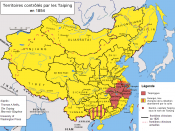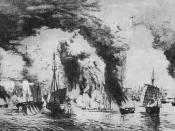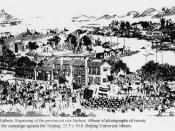World History Mrs. Beeler 3rd Period Taiping Rebellion Alex Frantzides Although China was enticed by European culture during The Opium War, this European influence lead to the degradation of the country in the mid-19th century through a series of rebellions that reached their paramount during The Taiping Rebellion.
The Qing dynasty ruled China for a span of over 250 years, but it wasn't always the case that Qing rulers were strong leaders. During the time of the Taiping up rise enormous population pressures were put upon China. The Qing dynasty was also haunted by what seemed an endless amount of consistent natural disasters, in which there aftermath was never rejuvenated. In result to these flaws there always seemed to be a tedious process of regaining taken parts of the empire. This became an ordinary and common process of receiving and losing land. The Qing dynasty was also faced with the Taiping rebellion, which led to the crumble of Qing rule.
Nurtured by Hong Xiuquan, The Taiping rebellion lasted for 14 years and by the winter of its long life; over 30 million were reported dead. Hong Xiuquan, the son of a farmer, was raised and came under the influence by Christian Missionaries. He concluded that he was the younger son of Jesus and was destined to create a Heavenly Kingdom on earth. These rage-stricken visions were spawned by his repeated unsuccessful attempts at gaining an upper hand spot in the Chinese government. Hong's mission was to rid China of evil influences such as the Manchu's, Taoists, Buddhists, and Confucians. Many poor peasants, workers, and miners were attracted to this new faith. The converts believed that God ordered them to destroy Manchu rule and set up a new renovated Christian brotherhood. The Taiping had begun a rough draft...


